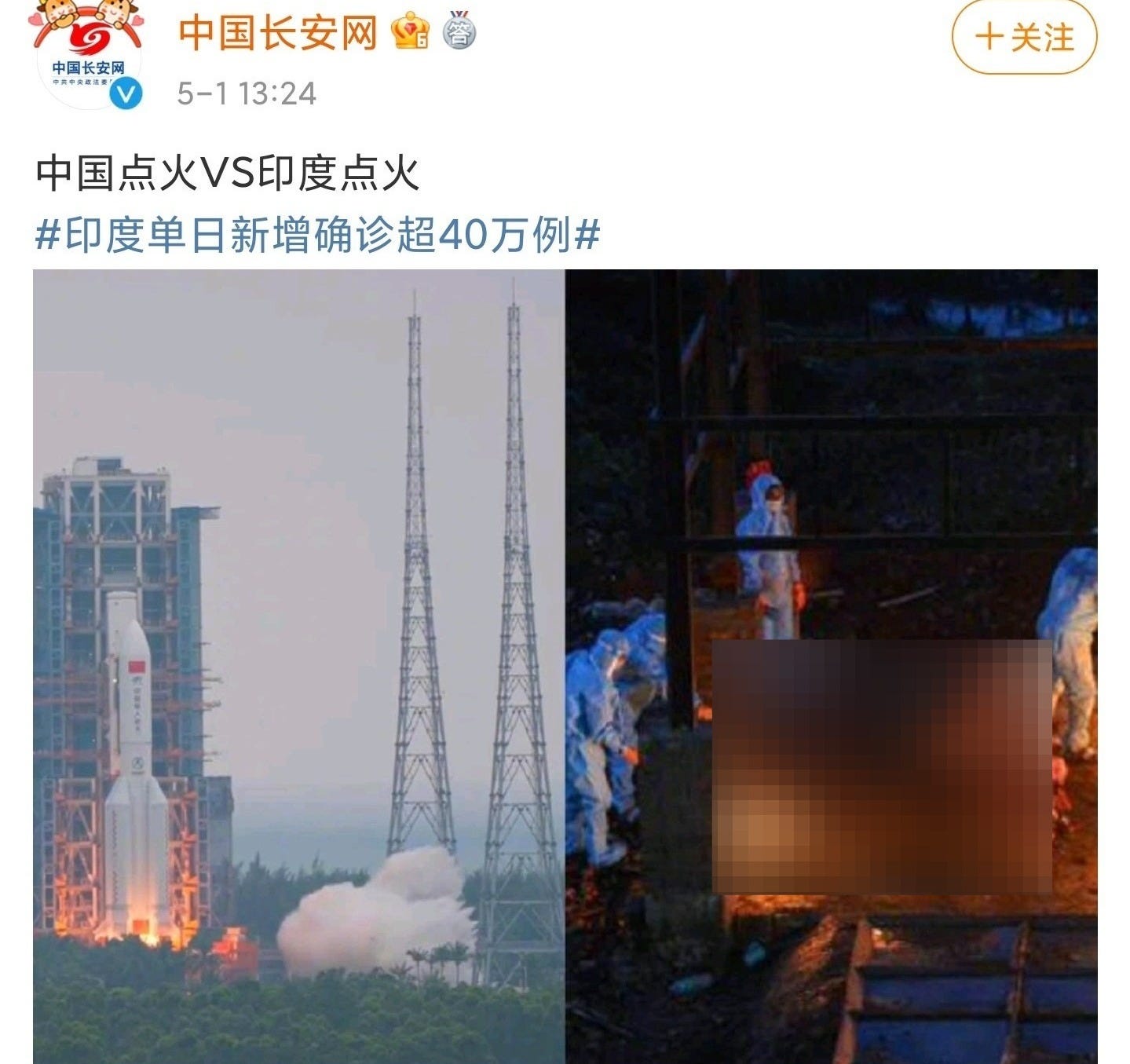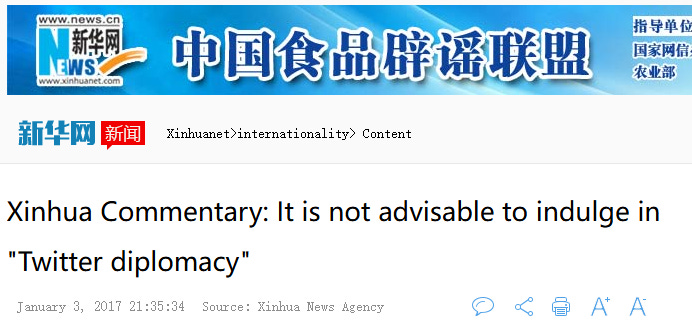Wolf Warriorism: China's disastrous attempt at aggressive discourse is over
Hemmed in by a stuttering economy and low foreign opinion, Beijing is trying to 'play nice' again. Phew.
A few years ago, the Chinese state found its bark.
“Why are western predictions about China a laughing stock?” asked one Global Times video. The US is less democratic than the PRC, rapped China Daily.
Diplomats jumped the Great Firewall and sought to eclipse one and another in a series of attention-seeking posts on western platforms. “Taiwan is part of China. Those who play with fire will get burned. Period,“ warned the UK ambassador.
‘Ex-soviet countries don’t exist under law’, said the one to France.
When a US official celebrated the Hong Kong government bowing to some protesters demands, China’s Ministry of Foreign Affairs spokeswoman replied with the dying words of George Floyd. “I can’t breathe.”
Her colleague tweeted black people lower property prices.
The nadir was quite possibly hit by the Central Commission for Political and Legal Affairs in 2021. “China lighting a fire vs India lighting a fire,” they posted on Weibo, showing China launching a rocket to space, while India cremated their Covid victims.
That one went too far. It was quickly deleted.
‘Wolf Warriorism’ became the accepted term for this nationalistic, aggressive form of discourse. No more demure Asian state. China had summoned a new-found arrogance, belligerence.
In 2021, I summed up the general tone as: “I’m China, f— you.”
But the movement failed spectacularly. And today, the state is in full-on damage-reparation mode (more on this at the end).
So, how did Wolf Warriorism come about, and why did it fail?
This is a quick whip through that topic, by someone who was pulling his hair out through the whole thing…
How Wolf Warriorism took hold
Trump’s first term coincided almost perfectly with my time in Chinese state media.
Until 2016, China’s international-facing state media (Xinhua, CGTN, China Daily et al) could be described as still languishing under Hu-ism ideals of quiet globalism.
Most output fell under Deng Xiaopeng’s famous mantra: “observe calmly, secure our position, cope with affairs calmly, hide our capacities and bide our time, be good at maintaining a low profile, and never claim leadership”.
“China used to passively respond to the international public opinion,” noted Zhang Tengjun in 2019.
The biggest influence was mainstream news. We always had four TVs on in our office, tuned to our network, CCTV, CNN and BBC. Most output was a staid, less slick imitation of what overseas were doing. Banal, timid, informative propaganda.
So what changed?
Many have pointed to Xi Jinping as the source of Wolf Warriorism. Particularly his famous tour of state media where he said journalists “must work to speak for the Party”.
But that wasn’t my experience at all. Sure, content noticeably became redder in the aftermath, and cultist toward the President. It made staff more confident of their politics, but it did nothing to prompt them to be more outwardly aggressive, or assertive in their writing.
No. For China comms, Trump was the catalyst.
State media were taken aback, aghast with how abrasive, personal and directly threatening to China Trump was.
They struggled to keep up, let alone reply. Each of his tweets — and there was a lot of them — carried massive potential ramifications.
The protocol was that no Chinese news outlet could comment on major news until Xinhua led the line — itself often a deliberative, multi-agency process — which meant that all reactions were slow. Too slow. China worked in days. Trump worked in 140 characters.
‘Please, stop tweeting’ Xinhua pleaded in a commentary in January 2017.
Trump had broken the Chinese system.
Release the cubs
For a long time, state media operated mostly under defensive actions.
We were told explicitly that Trump was not to be criticised directly: his ego too easily bruised, his personality too volatile. Instead we could only attack his policies. Better: go after his team, or advisers. It wasn’t that Trump was wrong, he was just being fed bad advice. This, it was felt, would play to his ego. And, as his advisers rapidly dropped, were fired or quit, this policy was reinforced.
Yet this was just a holding pattern. Trump’s barrage continued. And domestic frustration grew.
It was this cauldron of factors: intense external pressure; nationalistic pride to defend itself, demand by citizens for China show teeth; to stand up to international “scolding”; and Xi's assertion we were now in a “New Era”, that Wolf Warriorism was born. It was time to attack.
In many ways, Wolf Warriorism was no more than Trumpism with Chinese Characteristics.
“Make America Great Again” became “New Era”. Both trained their fire on global institutions as the UN, NATO, EU. Their strongest proponents were from rural communities. They derided established media like CNN, BBC, or pre-Musk Twitter as “fake news”. Yet they peddled conspiracy theories from Russian proxy sites.
They hated foreigners, gays, and liberal progressives. They fetishized the military, guns, rockets and dying for your country.
Despite idolising strongmen and absolute power, they had surprisingly brittle temperaments. “Traditional values” were under attack, a litany of transgressors including Dulce & Gabana, H&M, and Canada Goose all “hurt national feelings”.
From this milieu, Chinese media began picking up the fringes of western politics. Politicians like MP George Galloway, or MEP Clare Daley. Alternative voices, like Code Pink or Ben Norton. When businessmen stopped answering the phone, bookers grabbed Youtubers, happy for the exposure.
Internally, patriotism was the new currency. Rather than talent.
Chinese staff willing to say what others baulked at were promoted and pushed. One high-profile CGTN host admitted to me they felt pressured into ‘spicing up’ their content, in worry of being left behind by the new ethos, and overtaken by other colleagues.
It was a collective bubble of manufactured hate. An echo of the Cultural Revolution.
And it was an unmitigated disaster.
Unfit tools
At this point, it is worth clarifying how behind Chinese media were/are in comparison to their western counterparts.
CNC, Xinhua’s TV station rented a studio on Times Square. Yet the network broadcast only 4 hours of standard definition content per day worldwide, all pre-recorded. Nearly none of my colleagues had journalistic training: most a hodgepodge of English degrees, modelling backgrounds, and nepotistic hires.
If Chinese content was reported overseas, it tended to be for bad, bad, bad, or deeply cringey reasons.
So when it came time for these organisations to “fight back”, many simply didn’t have the tools, the aptitude, or the deep understanding of how foreign audiences tick in order to hit right.
There was an odd propensity for children’s song, cutesy kawaii smash-cut with geopolitics 101. Like when China Daily turned the Ukraine war into a nursery rhyme, or when Xinhua’s Wang Dier sang a sea shanty with a trip of cartoon goats.
Often, their efforts would come off as amateurish, caused more damage to themselves, like this lumpen attempt at satire, which prompted a rare comment from the head of MI6, thanking Xinhua staff for the “free publicity”.
In China, they call a state employment a tiě fàn wǎn or “iron rice bowl”, meaning job for life. In most media round the world, continual embarrassing output tends to end with a cardboard box. In my experience, someone’s nephew, or mistress is often allowed to fester on, quietly embarrassing the state.
Calm the troops
Look closely though, and the CPC’s external communications have changed recently.
Nearly all the satire shows have been dumped, or no longer promoted. Ambassadors have calmed their words. Sometime, around a year ago, there was an internal recognition that something wasn’t working.
Hong Kong. Xinjiang. Covid. Taiwan. Ukraine. South China Sea. Wave, after wave of negative stories has hit China this past decade, putting it on the wrong side of public opinion with much of the world. There’s only so much fighting the tide one can do, before you start drowning.
International public opinion of China is at now at historic lows, and falling. Not just with the western world but also with one-time friendly nations, like Philippines, Turkey and Hungary — or protests in nations the CPC have pumped full of Belt & Road cash.

China’s economic squeeze, its over-reliance on exports, and its slow rebound in international visitors following the pandemic has only exacerbated the internal panic.
There’s now an active effort to soften China’s international image; cage the wolf.
Internal dictums have asked censors to carefully moderate blogs, and crack down on KOL’s seeking to farm outrage for clicks. In November, prominent ultra-nationalist blogger Sima Nan was banned from social media for a year.
One of the earliest signs came at the very top in January 2023, when MoFA spokesman Zhao Lijian — probably the most bombastic of the CPC’s spokespeople — was reshuffled to an obscure department, at the division of borders and maritime affairs.
Most assert the ‘promotion’ was more to do with Lijian’s wife, and her problematic weibo posts — however it’s noticeable just how much his colleagues have toned down their statements since.
In April 2021, Hua Chunying answered a question from a BBC journalist with a four minute lecture on how the Beeb is not trusted, even in the UK.
Contrast that to this year, where a video posted on Twitter by a Global Times journalist, showed Chunying chatting with BBC staff at a Chinese New Year party thrown by MoFA.
“We look forward to more good stories,” she tells them. “We trust you. We rely on you.”
This year’s Two Sessions, China’s annual political showcase, were noticeable for the number of foreign journalists — about 1,000 from Hong Kong, Macao, Taiwan and abroad. Many were from Global South and Belt & Road countries, first-time attendees as part of a diplomatic/propaganda push, yet even ‘hostile’ western news outlets found it noticeably easier to get passes.

That’s the public side. What’s not reported widely is the schmooze campaign currently underway behind closed doors.
Officials — particularly from MoFA, the Publicity department, Information Office and local branches — have stepped up private engagements with foreign journalists. Media are being showered with dinners, drinks, invitations to events, presents, and off-the-record meetings where they can “make recommendations” on how to better improve relations.
After being targeted for so long, so publicly, and so vehemently, foreign journalists are … confused.
Admittedly, it’s not all good news. Also, this is a trend: not an absolute.
Long-term visas are still being tightly withheld for overseas media, or games played (one didn’t receive his renewal until he was in the taxi to the airport). Foreign press are still routinely tailed, their Chinese friends and sources interviewed by police.
But there are examples showing this new détente.
Zhuhai
On 12 November, BBC journalist Stephen McDonell was obstructed by “plain clothes” individuals while reporting from near the Zhuhai massacre. The footage went viral round the world.
On cue, nationalist merchants were apoplectic. Shanghai Daily’s Andy Boreham produced no fewer than 30+ tweets. While Jerry Grey, the Australian policeman-turned-YouTuber, who’s appeared extensively on state media, went even further, calling for Stephen to “get what he deserves”.
However, at a national level, word on BBC’s harassment was unusually quiet.
Unlike the times with John Sudworth in Xinjiang in 2021, or in Beijing in 2016, or Dutch reporter Sjoerd den Daas during the Olympics, or the LA Times’ Alice Su during the Zhenghou flooding, or the many, many more times reporters have obstructed from doing their job, official reaction was silent.
Not one top tier state media mentioned the incident, or rebuked ‘BBC lies’. There was no four minute lecture from a MoFA spokesperson this time. No China Daily exposé documentary. No Global Times cartoon.
In fact, just a few days later, Ed Lawrence, the BBC Cameraman who filmed the incident, posted how Shanghai officials had taken him to dinner.
This incident is also a good example of how China’s “borrowed mouths” — once cultivated and promoted heavily by the state during China’s Wolf Warriorism phase — have fallen so quickly out of lockstep with the people they aim (and depend) on pleasing.
Not only are these YouTubers’ content cited less by outlets, clipped or amplified, but there’s been an active effort by the state to platform these individuals less.
Behind the scenes, state media have belatedly realised these figures bring little value.
At its peak — particularly during the fallow Covid closed border years — ‘friendly’ foreign political content creators were rewarded with invites as talking heads on news channels, write commentaries, or given paid holidays as hosts of travel videos. It was seen as a way to indirectly (and sometimes directly) fund them, and their eagerness to say Beijing-friendly lines.
This policy has now quietly been dropped.

Instead, there has been a conscious decision to replace them as opinion givers with other voices: professionals with more gravitas (retired-diplomats, CEOs, think tanks) for geopolitics’; squeaky-clean young BRICS/Belt & Road students for tourism.
Times-are-indeed-a-changing.
A determined thaw
Squeezed by a gasping economy, a stuttering Belt & Road project, and falling public opinion overseas, it’s likely that China will play safe for the foreseeable.
It simply has too many wobbly plates to balance. Why risk it with another run of abrasive reactionary content?
Yes, there are still remnants of Wolf Warriorism output. But these are increasingly becoming fringe, yesterday’s content. China is also coming to terms with the loss of Twitter as an overseas propaganda platform (Plug. See my last article)
Both publicly, and behind the scenes, there is a determined thaw.
When Trump left office the first time, Xinhua celebrated it with an infamous commentary titled: “Good riddance, Trump administration and its final madness”. On his re-election, Xinhua barely mentioned him, instead using most of the article to push one of its favoured tropes: how messy and “utterly divisive” elections are.
Even reaction to Trump’s proposed ten percent tariffs on Chinese goods has been muted.
China is in a new ‘old’ era. The vast majority of state communications these days emphasise placid positivity. In many ways, it is similar to the environment I first walked into in 2016 — albeit with subtle changes.
There’s a much larger reliance on the Global South. The President of Samoa is given the same status as the President of France.
In media, gone are the imported western hosts, with their expensive annual contracts and irksome politics. In are a slew of young day-hires or “competition winners” from amenable countries: Russian models, students from Pakistan or TikTockers from Kenya. Content is now mostly reduced to its most basic form: “Oh wow. I’ve ever been to China before, I didn’t realise it is so good.”
Content still lacks that spark, that joie de vivre, that can only ever come from left-field creators, disruptors, or — quelle horror! — professionals. And it will be forever, so long the top line of every state media job description states: “must hold positive views of the Chinese Communist Party”... But at least it’s safe.
For better, or for worse, the Party is a luminary in adaptation, self-preservation. It got burnt by Trump the first time: barked before it was ready. Right now, the CPC is back to Deng’s advice of “biding its time”.
If it can just hold its tongue, continue to flatter or suborn Global South allies — especially those that fall foul of US policies — it may yet escape Trump’s second term stronger than the first.
It’s no longer: “I’m China, F— you.”
Today, the message is: “I’m China, please like me.”










Related to your thoughts and experiences on many levels. Thanks for sharing
Excellent observations. I certainly don't know for sure...if anyone does...but I think this might link to a few comments in the not distant past, paraphrased along the lines of "You (the west) talk about democracy. We have democracy that suits our system"... which I interpreted to mean we argued our asses off behind closed doors and Xi listened.
From my perch in Wuhan, it's apparent there are some very smart people running operations at high levels, and they are increasingly at odds with Big Daddy's proclamations of the recent past. Take for instance the not distant past initiative where all State universities were going to be renamed "University of Marxist Something Or Other". That kinda evaporated so quickly even the university professors were amused.
There has been a small mountain of policy papers from the highest levels of academic party members politely and respectfully proposing recommendations that are/were all at odds with Xi's proclamations. No one was taking a direct shot at Xi or dissing current Party policy, but all were recommending paths directly the opposite of Xi's proclamations. I think Xi was listening, or was forced to listen because his stuff wasn't working for all the obvious reasons.
I liken it to the Catholic church, which folks think is an unchanging monolith. If one reviews the large number of encyclicals constantly coming out of the Vatican, and reads them closely, one will see little changes here, and another there, and subsequent teeny shifts in outward initiatives. I am not the first or only individual to note this.
From a historical perspective, it fits. Emperors proclaim and maybe even get traction for a bit, and then actual policy is effectuated by the bureaucracy with minute changes in different areas as functionaries tune things to fit their local needs.
Or not. It's all conjecture on my part. I'm just glad the WW crap is shitcanned. That guy on late night TV with the camo gear spouting inanities was obnoxious. I've also noticed a distinct lightening up in my relationships that's pleasant.